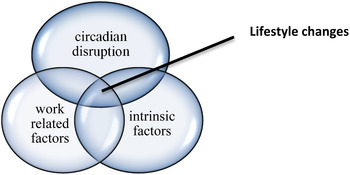Shift work has been suggested to have a negative impact on health, increasing risk of chronic disease( Reference Wang, Armstrong and Cairns 1 ). Much of this has been related to circadian disruption; however it may in part be linked to some of the observed lifestyle changes associated with shift work( Reference Peplonska, Burdelak and Krysicka 2 ). This qualitative study aimed to investigate the impact of shift work on the diet and lifestyle of shift workers and identify the barriers and facilitators to improving lifestyle behaviours, with a particular focus on the role of the workplace environment. Focus group discussions (n 15) were used among shift workers (n 109) from the 3 main sectors employing shift workers on the island of Ireland (IoI); the accommodation and food services sector, the health and social care sector and the manufacturing sector. Most participants perceived shift work to impact negatively on their dietary and lifestyle behaviours. Irregular eating patterns were evident, with meal skipping common and increased snacking as a compensatory measure. Energy dense and sugary snacks were frequently relied on, in addition to convenience and processed foods. Many displayed good nutritional knowledge however expressed difficulty with applying this in practice due to various perceived barriers. The main barriers to a healthier lifestyle included: an erratic routine, tiredness due to circadian disruption, a lack of time and poor time management, difficulty accessing healthy food, and features of the workplace environment such as a lack of facilities for buying, storing or preparing food and insufficient break times. While some of these barriers may be difficult to avoid completely, such as an erratic routine due to changing shifts or tiredness due to disrupted sleep, the importance of a supportive workplace environment was highlighted as central to facilitating a healthier lifestyle in the context of shift work. In addition, intrinsic factors such as lack of motivation appear to influence workers’ ability to make lifestyle changes.

While it is not possible to fully negate the impact of shift work on circadian rhythms, opportunities and interventions to improve lifestyle behaviours among shift workers should be explored, particularly in the context of the workplace environment.


